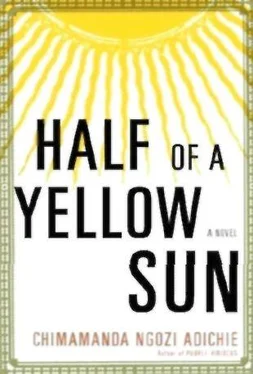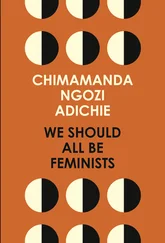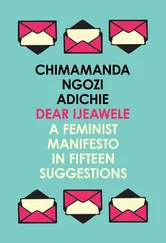He would not have come to the house now if her mother had not asked him to.
"Go to the house, Richard, please just go and see." Her voice was small on the phone. During his first conversations with her, when they first returned from London, she had sounded so different, so full of certitude.
"Kainene must have been wounded somewhere. We must get the word out. We have to do it quickly so we can move her to a better hospital. When she is well, I will ask her what we can do about that Yoruba sheep we thought was our friend. Imagine the man making us buy our own house. Imagine forging ownership papers and everything and saying we should be happy he was not asking for much; on top of that he took the furniture. Kainene's father is too afraid to say anything. He is grateful they let him keep a house that is his own. Kainene would never tolerate that."
She was different now. It was as if the more time had passed, the more her faith had leaked away. Just go and see the house, she had said. Just go and see. She no longer spoke in specifics, in definites. Madu was staying with them in Lagos, now that he had been released from his long detention at Alagbon Close; now that he had been dismissed from the Nigerian Army; now that he had been given fifty pounds for all the money he had before and during the war. It was Madu who had received word that a thin, tall educated woman had been found wandering in Onitsha. Richard went with Olanna to Onitsha and her mother met them there, but the woman was not Kainene. Richard had been so certain that it was Kainene-she had amnesia, she had forgotten herself, it all made sense-and when he looked into the stranger's eyes, he had felt for the first time a deep hate for a person he did not know.
He thought of it now as he drove to Umuahia, to the center for displaced persons. The building was empty. Nearby, a bomb crater gaped unfilled. He drove around for a while before he found the address Ugwu had given him. The elderly woman he greeted looked completely indifferent, as though it was often that an Igbo-speaking white man came in to ask about her relative. It surprised Richard; he was used to his Igbo-speaking whiteness being noticed, being marveled at. She brought him a seat. She told him she was the sister of Eberechi's father and, as soon as she told him what had happened to Eberechi, Richard decided that he would not tell Ugwu. He would never tell Ugwu. Eberechi's aunty had a white scarf tied around her head and a soiled wrapper around her chest and she spoke so quietly that Richard had to ask her to repeat herself. She looked at him for a moment before she told him, again, that Eberechi had been killed by shelling, that it had happened on the day that Umuahia fell, and that, only days later, Eberechi's brother in the army came back alive and well. Richard did not know why, but he sat down and told the woman about Kainene.
"My wife went on afia attack some days before the war ended, and we have not seen her since."
The woman shrugged. "One day you will know," she said.
Richard thought about those words on his way to Lagos the next day and he became even more convinced that he would not tell Ugwu that Eberechi was dead. One day Ugwu would know. For now, he would not break Ugwu's dream.
It was raining when he arrived in Lagos. On the car radio, Gowon's speech was broadcast yet again: No victor and no vanquished. Newspaper vendors were running around in traffic with their papers wrapped in polythene bags. He no longer read newspapers because each one he opened seemed to have the advertisement that Kainene's parents had placed, with the photo of Kainene taken by the pool, under the heading missing. It was oppressive, as oppressive as Aunt Elizabeth telling him to "be strong," her voice warbly over the phone, as if there were something she knew that he did not. He did not need to be strong for anything. And Kainene was not missing; she was just taking her time before she came home.
Her mother hugged him. "Have you been eating, Richard?" she asked, in a fond familiar way, the way a mother would speak to a son who had neglected to take care of himself. She held him tightly, leaning on him, when they walked into the sparse living room, and he had the glorious and uncomfortable feeling that she thought she was somehow holding on to Kainene by holding on to him.
Kainene's father was sitting with Madu and two other men from Umunnachi. Richard shook hands and joined them. They were drinking beer and talking about the indigenization decree, the civil servants being jobless. Their voices were low, as though being indoors was not secure enough. Richard got up and climbed the stairs to Kainene's old room, but nothing of hers was left. The walls were studded with nails; perhaps the Yoruba occupier had hung up many photos.
The stew that was served at lunch had too much crayfish; Kainene would not have liked it and she would have leaned toward him and said so. After lunch, Richard and Madu went out to sit on the veranda. The rain had stopped, and the leaves of the plants down below looked greener.
"The foreigners say that one million died," Madu said. "That can't be."
Richard waited. He was not sure he wanted to have one of those conversations so many Biafrans had now, passing kernels of blame to others, oiling their own faces with a valor they had never had. He wanted to remember how he and Kainene had often stood here and looked down at the silver swimming pool.
"It can't be just one million." Madu sipped his beer. "Will you go back to England?"
The question annoyed him. "No."
"You'll stay in Nsukka?"
"Yes. I'm joining the new Institute for African Studies."
"Are you writing anything?"
"No."
Madu placed his glass of beer down; water droplets clustered on it like tiny see-through pebbles. "I don't understand how we have found out nothing about Kainene, I don't understand it at all," Madu said.
Richard did not like the sound of we, did not know who Madu included in it. He got up and walked across the balcony and looked down at the drained pool; the floor was made of polished whitish stone, visible through the thin sheet of rainwater. He turned back to Madu. "You love her, don't you?" he asked.
"Of course I love her."
"Did you ever touch her?"
Madu's laugh was short and harsh.,
"Did you ever touch her?" Richard asked again, and Madu was suddenly responsible for Kainene's disappearance. "Did you ever touch her?"
Madu got up. Richard reached out and grasped his arm. Come back, he wanted to say, come back here and tell me if you ever laid your filthy black hand on her. Madu shrugged Richard's hand off. Richard hit him across the face and felt his hand begin to throb.
"You idiot," Madu said, surprised, staggering slightly.
Richard saw Madu's arm raised, saw the swift blurred movement of a coming punch. It landed on his nose, and the pain exploded all over his face and his body felt very light as it sank down to the floor. When he touched his nose, there was blood on his fingers.
"You idiot," Madu said again.
Richard could not get up. He pulled out his handkerchief; his hands trembled and he got some of the blood on his shirt. Madu watched him for a moment and then bent down and held his face between wide palms and examined his nose closely. Richard could smell the crayfish on Madu's breath.
"I didn't break it," Madu said, and straightened up.
Richard dabbed at his nose. Darkness descended on him, and when it lifted he knew that he would never see Kainene again and that his life would always be like a candlelit room; he would see things only in shadow, only in half glimpses.
Olanna's moments of solid hope,when she was certain that Kainene would come back, were followed by stretches of raw-pain, and then a surge of faith would make her hum under her breath, until the downward slide came and she would be crumpled on the floor, weeping and weeping. Miss Adebayo visited and said something about grief, something nice-sounding and facile: Grief was the celebration of love, those who could feel real grief were lucky to have loved. But it was not grief that Olanna felt, it was greater than grief. It was stranger than grief. She did not know where her sister was. She did not know. She raged at herself for not waking up early the day that Kainene left for afia attack and for not knowing what Kainene wore that morning and for not going with her and for trusting that Inatimi knew where he was leading her. She raged at the world when she boarded buses or climbed in beside Odenigbo or Richard to go to crowded hospitals and dusty buildings to search for Kainene and did not find her.
Читать дальше












